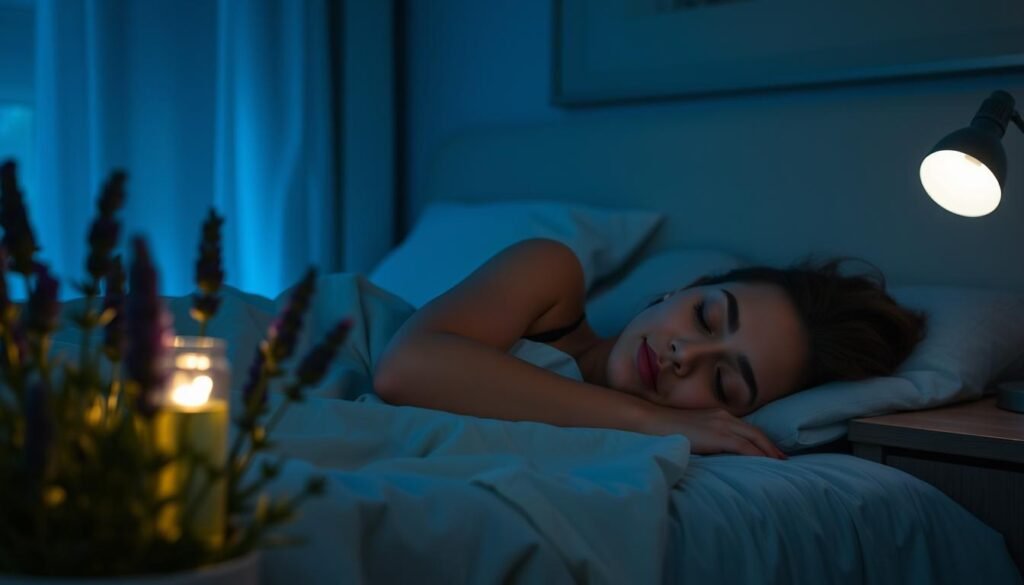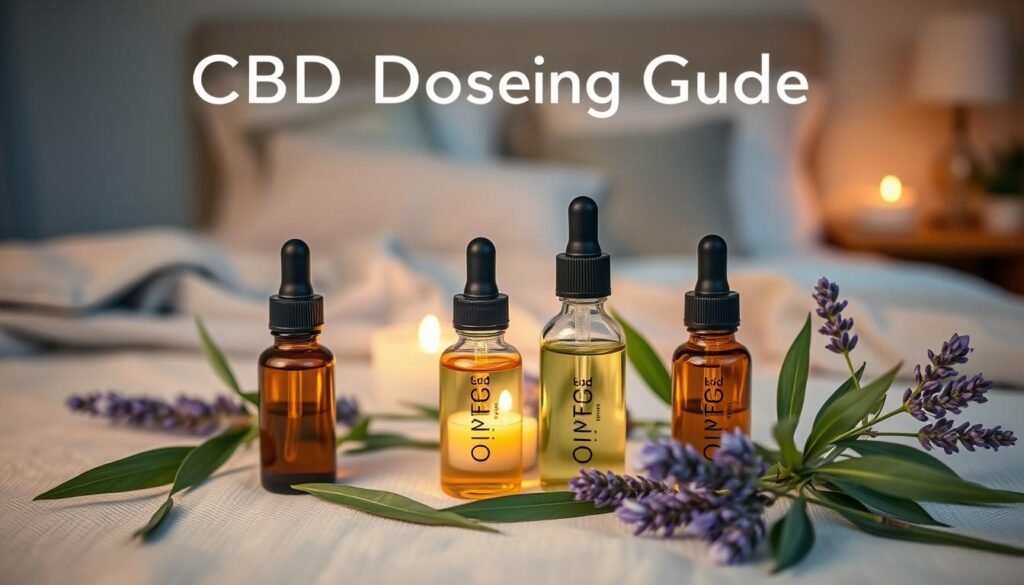Did you know experts often suggest taking 1–6 mg of CBD per 10 pounds of body weight for sleep and anxiety relief? This fact shows the need to find the right CBD dose for each person, as amounts needed can vary a lot. People’s mental health is crucial. Yet, finding the perfect CBD dosage might feel daunting. This is due to different product types and how uniquely our bodies respond.
This guide dives deep into CBD dosing for insomnia and anxiety issues. It covers why CBD might help, the various CBD forms available, and key tips like starting with small doses and adjusting. Consulting a healthcare professional before trying CBD is also critical. For more on dosing advice, check out this helpful resource. It explains how CBD might lessen anxiety and better sleep quality.
Key Takeaways
- Dosage recommendations typically range from 15-90 mg of CBD based on individual weight and needs.
- CBD users often take between 100 mg and 200 mg of CBD daily.
- Different forms of CBD products can affect how much is needed for effective results.
- CBD may interact with medications, so consulting with a healthcare provider is advisable.
- Higher dosages of CBD are often required for treating severe insomnia.
- Understanding personal responses to CBD is crucial for finding the right dosage.
Introduction to CBD and Its Benefits
Cannabidiol, commonly known as CBD, is becoming a top choice for mental health improvement. A lot of people use CBD to sleep better and reduce anxiety. Unlike THC, CBD won’t make you feel high, but it offers a therapeutic effect.
Recent studies show that CBD could help with anxiety and sleep. For example, research in Fort Collins, CO, found that 79.2% of patients had lower anxiety after using CBD for a month. Also, 66.7% of patients said they slept better during this time. This research underlines the potential benefits of CBD and stresses the need for good-quality products.
When choosing a CBD supplement, it’s important to pick a safe and high-quality product. The study mentioned that most patients handled CBD well, with doses from 25 mg to 175 mg. However, poor-quality CBD can lead to uneven results.
Research into CBD is ongoing, and it shows promise for treating mental health issues. Knowing about these benefits can help people decide if CBD is right for their health routines.
| Benefit | Statistic | Notes |
|---|---|---|
| Decrease in Anxiety | 79.2% | Patients noticed a reduction in anxiety scores within a month. |
| Improvement in Sleep | 66.7% | Patients reported better sleep scores during the same timeframe. |
| Well Tolerated | 97%+ | All but 3 patients tolerated CBD without adverse reactions. |
Understanding CBD and THC
Cannabidiol (CBD) and tetrahydrocannabinol (THC) are the main cannabinoids in cannabis. Knowing how they differ is key for those looking for health benefits. CBD doesn’t make you feel “high” like THC does. Yet, it’s great for reducing stress and improving sleep. Studies show CBD helps with anxiety better than THC. This makes it a good choice for treating such conditions.
About 40 million Americans over 18 suffer from anxiety disorders every year. One study with 300 people looked at how different CBD and THC ratios affect anxiety. The results showed that products with 24% CBD and only 1% THC helped decrease anxiety the most.

Research shows that CBD products vary, from 99% pure CBD to broad-spectrum options. However, there’s a concern about the accuracy of product labels. Over 25% of CBD products might have less CBD than their labels say. This could lead to unexpected issues, like failing drug tests because of THC trace. So, understanding the THC content is crucial for making smart choices.
The laws on CBD are changing. The federal government allows selling hemp-derived CBD. Now, 38 states, three territories, and D.C. permit medical cannabis use, including THC, with a prescription. This changing legal scene means those using CBD for anxiety or sleep issues need to stay informed.
For extra help on choosing the right CBD:THC ratio, check out this resource. It offers advice on picking cannabis products that meet your health needs while being safe and effective.
The Science Behind CBD for Sleep and Anxiety
Recently, research into how CBD can help with anxiety has picked up. It’s noted that around 80% of folks using CBD saw their anxiety decrease in a month. Studies also suggest that CBD can improve how well we sleep. This is good news since up to 70% of Americans have trouble sleeping enough.
The endocannabinoid system helps regulate our emotions through specific receptors. Early studies show CBD could help treat various anxiety disorders with the right dosage. Yet, most research has only looked at short-term usage. We need to know more about the long-term benefits and effects.

CBD is generally safe to use, even in doses as high as 1500 mg per day, with few side effects. This makes it a promising option for anxiety treatment. Especially since many current medications don’t work well for everyone. Anxiety disorders can really affect someone’s job and personal life, highlighting the need for new treatments.
Although the initial research is encouraging, a small number of CBD products on the market are as strong as they claim. Only 26% have less CBD than they should, and 43% have more. As interest in CBD grows, so does the importance of solid research. We need to understand the best ways to use CBD for both sleep and anxiety.
cbd dose for sleep and anxiety
Finding the right CBD dose for sleep and anxiety isn’t easy. Results vary for everyone. It highlights the importance of tailoring the dose. Starting small is key, letting people increase dosages as needed.
Determining the Right Dosage
For better sleep, starting with 25 milligrams of CBD an hour or two before bed is recommended. Between 25 to 75 milligrams helped improve sleep for two-thirds of users. This dose can be tweaked depending on how one’s body reacts, considering factors like body weight and health conditions.
Factors Influencing Individual Responses
Several things can change how CBD affects you, including:
- Body Weight: More weight may need more CBD to feel the effect.
- Metabolism: How fast you process CBD matters.
- Existing Health Conditions: Issues like chronic pain can change CBD’s impact.
- Product Type: The form of CBD used can make a difference.

Interestingly, small doses, around 15 milligrams, might keep you awake instead of soothing you. Watching how your body reacts to CBD is vital for fine-tuning the dose to get the best results.
| Dose Range (mg) | Effect on Sleep |
|---|---|
| 5 – 15 | May induce alertness; potential stimulant effect |
| 25 – 75 | Improves sleep quality for 66.7% of users |
| 150 – 600 | Often produces a sedative effect |
| Up to 1500 | Some individuals tolerate high doses without adverse effects |
Be mindful of side effects like diarrhea, fatigue, and nausea, especially with higher doses. Talking to a doctor before starting CBD is crucial, especially if you have health issues or take other meds.
Recommended Dosages for Insomnia and Anxiety
Finding the right cbd dosage insomnia can greatly improve sleep and reduce anxiety. Studies show that the amount needed varies by person. Before starting CBD, it’s best to get advice from a healthcare expert.
Typical Dosage Ranges in Research
Research suggests that for CBD to work well, doses of 300 mg or more are needed. For anxiety relief, the usual dose is between 300 to 600 mg. But, doses under 300 mg may not consistently help with insomnia or pain.
In the US and EU, most users take CBD doses below 1 mg/kg, usually 10 to 25 mg daily. About 80% of people felt less anxious after taking 25 mg of CBD capsules every day.
How to Calculate Your Starting Dose
To find the right starting dose, begin with 2.5 mg of CBD per kg of body weight. So, a 70 kg person might start with 175 mg of CBD. It’s important to keep track of your use. Writing down your doses helps find the best amount for good sleep and anxiety control.
| Weight (kg) | Starting Dose (mg) | Typical Dosage (mg) |
|---|---|---|
| 50 | 125 | 300-600 |
| 70 | 175 | 300-600 |
| 90 | 225 | 300-600 |
Before using CBD for sleep or anxiety, talk to a healthcare professional. Changes based on how your body reacts and the type of product used can help you feel better.
Potential Side Effects of CBD
CBD products have become more popular, with 14 percent of American adults using them in 2019. It’s important to know the potential side effects of CBD, even though it’s generally seen as safe. Users have reported issues such as:
- Fatigue
- Changes in appetite
- Diarrhea
- Gastrointestinal problems
- Potential liver injury
- Interference with other medications
- Changes in mood or alertness
- Impact on male fertility
With CBD products often sold over the counter and not tested by the FDA, safety is key. These products might have more THC based on where you live or could have harmful extras.
The World Health Organization says CBD is generally safe and not likely to be abused. But we still need more research about how CBD affects our health over time. It’s very important for people with health issues or taking other medicines to talk to a doctor before trying CBD gummies or oils.
Types of CBD Products Available
The market is full of different CBD products. Knowing about these products can help people choose based on their needs. You can find oils, tinctures, edibles, and topicals, each with unique benefits.
Oils, Tinctures, and Edibles
CBD oils and tinctures are easy to use and very versatile. They come in bottles which makes getting the right dose easy. This helps users change their dose as needed. Edibles, like gummies, are a great and tasty way to use CBD discreetly. Sunday Scaries has gummies with 25 mg of CBD each for those who need help with anxiety.
Topicals and Their Uses
Topicals like creams and bath products are great for targeting specific areas. A good example is the CBD bath bomb from CBDfx, with 200 mg of CBD and scents like Eucalyptus and Lavender. These products are mainly for physical issues and don’t have the mental health benefits of oils and tinctures.
| Type of CBD Product | Potency/Details | Recommended Use |
|---|---|---|
| Oils and Tinctures | 500 mg to 5,000 mg per 30-mL bottle | Flexible dosing for anxiety and relaxation |
| Edibles (Gummies) | 25 mg of CBD per gummy | Convenient and tasty option for on-the-go relief |
| Topicals (Creams,Bath Bombs) | 200 mg of CBD per bath bomb | Localized relief for physical discomfort |
How to Monitor Your CBD Intake
Learning to monitor CBD intake is key for effective symptom management. Tracking dosage and effects lets people customize their use based on what they need. Writing down what you notice after each dose can reveal how it impacts your anxiety and well-being. Keeping a dosage journal helps spot patterns and improve treatment.
Keeping Track of Your Dosage and Effects
Keeping a dosage journal is a smart move. In it, you should note:
- Date and time of consumption.
- Amount of CBD taken (in milligrams).
- Specific product used.
- Physical and emotional state (any changes observed).
- Any side effects experienced.
Research shows starting with about 40 milligrams of CBD daily works best for some. Adjusting the amount by 5 milligrams weekly helps find the right dose with fewer side effects. This approach suits the aim of fine-tuning your CBD dosage based on personal reaction.
Adjusting Your Dose as Needed
It’s crucial to listen to your body when adjusting the dose. If anxiety doesn’t improve, it’s time to reconsider your dosage. While some handle up to 1,500 milligrams daily, it’s best to increase slowly. For gummies or capsules, dosages are straightforward. But oils and tinctures need a bit more work to figure out the right amount.
Keep an eye on how CBD affects you and tweak the dosage as needed. Watch out for side effects like feeling tired or hungry. Using products tested by others for quality assures you get a safe, effective CBD product. These steps help manage anxiety with the right CBD balance.
Conclusion
More and more research shows CBD helps with anxiety and sleep. Studies suggest that certain amounts of CBD are effective. For example, 25 mg may lower anxiety, while 160 mg could improve sleep.
However, introducing CBD to your health routine needs careful thought. People’s reactions to CBD can vary a lot. Even though many see great results, about 25% find their sleep gets worse. So, getting advice from health experts is key before starting CBD.
To wrap it up, CBD isn’t a cure-all, but it’s a valuable option for better sleep and anxiety control. With more research, we’ll understand even more about how CBD helps. Choosing reliable sources is important to make the best choices for anxiety management with CBD.